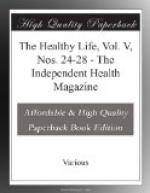“That there are plenty of ways of cooking an egg besides frying it,” said Felix, “and that a bit of common-sense is about the best article you can take with you out camping. Take your food as raw as you can get it and know how to cook it. Also know a good herb when you see it, and never overlook a chance of getting a meal from the country that will save your stores.”
C.R. FREEMAN.
Food reformers will have their own opinion about a diet of shrimps, sardines, tinned tongue and stale coffee when camping out: the most important part of the outfit is doubtless an adequate supply of common-sense.—[EDS.]
SEASICKNESS: SOME REMEDIES.
In the April and May numbers of the present year we published an article by Mr Hereward Carrington entitled “Seasickness: How Caused, How Cured.” The following supplementary suggestions by the same well-known writer will be useful to many readers.—[EDS.]
A very good plan, when you think of undertaking a voyage, is to begin to prepare for it several days in advance. For three or four days, before embarking, eat only very simple and somewhat laxative foods—such as fruits—so as to open the bowels well and tone up the system. This simple diet should be followed for the first two or three days aboard—of course not so rigidly, but taking care not to indulge in many heavy, greasy dishes. Unfortunately, the food on board is usually very rich and plentiful, and tempts one to eat. If one suffers from seasickness, there is not this same temptation, to be sure; but the malady may certainly be warded off, in the majority of cases, if only reasonable care be taken of the diet before and during the voyage, and if instructions herein laid down be followed.
As before stated, drugs are as a rule useless for the cure of seasickness; but on occasion a “seasick cure” of some kind may prove effective. The harm which results from the drug may perhaps be more than counterbalanced by the benefits which the system derives from the cessation of seasickness. A preparation of this kind which is very highly recommended by many travellers is known as “Antimermal,” and though none of these remedies are to be recommended with assurance, this one—and perhaps one or two others—might at least be tried, in cases of dire necessity, when seasickness has already supervened.
It is hardly necessary to say that the patient should remain in the open air continuously, until all symptoms of seasickness have paused. Live in your deck chair until you feel quite well and able to get up and walk round. Do not attempt to go downstairs into the dining-saloon to meals, if you feel in the slightest “squirmish.” Rather have some hot soup or broth of some kind sent up to you, and drink it sitting in your chair. Do not be afraid to drink water at all times, even if you feel ill—as the water is easily returned,




